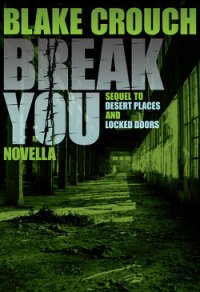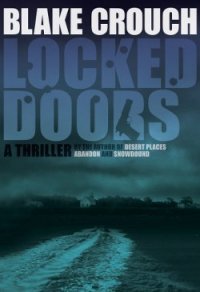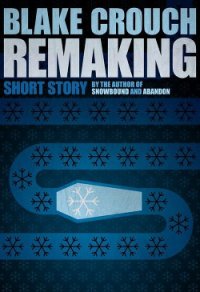Thicker Than Blood - Crouch Blake (читать книги полностью без сокращений txt) 📗
Crying now, "About me killing that boy?"
"I don’t know."
"Andy, please. Let me help you. You feel like this right now, but will you feel like this for the next fifteen years? Or the rest of your life? Do you honestly want to rot in prison?"
I sigh, lean back into the warm vinyl, the summer sky now fading into dusk. I can’t imagine next week. Can’t even see tomorrow. I could cry, but I don’t.
"Look, if I don’t do this, I won’t last. I’ll get up to the Yukon, kill myself. I’m close to it now. I want to. There’s comfort in the idea of it. Please do this for me, Vi. Please."
# # #
Vi guides us home—64 to Statesville, I-77 to Davidson. I sit in the passenger seat holding Max, asleep in my arms, watching rivers of carlight streaming south toward Charlotte.
As we cross Lake Norman, rimmed with the light of wealth, I think of my old home, glowing somewhere out there in a distant cove.
Vi reaches over, steadies my hands.
# # #
The knot in my stomach tightens when she veers onto Exit 30. I shut my eyes, feel the car come to rest at the stoplight. Ten seconds. Accelerating again. Turning left. Cruising through Davidson, the college close now. In the autumn, I’d take a manuscript and spread a blanket out on the grass of its lovely campus, surrounded by those tall, molting trees.
We make a right onto Jackson Street, my heart throbbing. After several blocks, we turn again. The car stops, Vi shifts into park, and the engine dies.
My eyes open. We’re parked in front of the Davidson Police Department.
It’s real now.
Vi says, "Sure you don’t want us to make a go of it up in Canada? Speak now or forever."
She’s kidding, but it sounds forced, her voice thick with tears. I look at her and see that she’s aching to be home. To forget.
"Better take him." I hand Max over, careful not to wake him. "Will you come in with me?"
"I need to go home, Andy. They’ll try to keep me here, and I want to see my husband before the madness starts."
I’ve gone short of breath.
"So just walk in there, huh?"
"Tell them who you are, that you’re turning yourself in."
I notice two men in plainclothes sitting on a bench near the entrance, having a good laugh. One of them gets up and staggers around, impersonating what can only be a bombed sobriety test.
"You’ll be all right, Vi?"
"Sure."
I open the door, step outside, and close it. The window is down. I peer back through it. Vi reaches out, squeezes my hand.
I walk toward the entrance. When I reach the sidewalk, I glance back, see Vi sitting in the Kites’ Impala, her pretty face lit by a streetlamp, crying.
I hear one of those men near the entrance say, "And this fuckwit didn’t even know he had the stop sign wrapped around his bumper. He’d been draggin’ the damn thing for two miles. I just followed the trail of sparks!"
The approach of my footsteps arrests their harsh laughter.
They exchange looks of fleeting embarrassment, caught in a moment of levity. Wiping their eyes, they regard me with the newfound scowls of lawmen, beefy blonds, clean-shaven, with hard, alert eyes and trimmed mustaches that blend into their pale faces.
I address the man who’s standing.
"You fellas police officers?"
"I am," he says.
The engine of the Impala roars to life.
"Could we have a word in private, please?"
# # #
The first thing Vi notices are the forsythia bushes. They were seedlings when she and Max planted them last September. In her absence, they’ve shot up nearly to the windows. She can’t bare to wonder what else has grown and changed and died.
She parks on the street and turns off the engine. Arcadia Acres twinkles in what she takes for eight p.m. silence, but as she gazes across the treeless subdivision at all the glowing houses, she detects a symphony.
Here are the instruments: whisper of lawn sprinklers, hammering, crickets, voices passing through thin walls, the mechanical tone of the nearby interstate. Suburban music. Fruit of a peaceful species. Vi basks in it. Lets it speak to her. Anesthetize her.
This is the norm. This is what is real.
She lifts Max from the passenger seat and opens the door.
As she walks around the car and onto the upward-sloping driveway, she notices that the garage door is open. A man kneels inside on the concrete, gently tapping a nail into a board. His back is to her, the shape of his body indistinct in the weak illumination of the overhead light bulb. Only when she stops, ten feet away, does she know with certainly that this man is her husband.
The tears begin to roll as she stands there, watching him start the nail. From the back, he seems to have lost his lean runner’s physique.
Max raises the hammer, strikes the nail with a concussive clack that startles Max Jr.
When the infant cries out, the man glances back.
A ghost stands in the driveway with a child in its arms.
# # #
In the late summer of twenty twenty-two, I was on the plains of west Kansas.
I was three days out from North Carolina, en route to Denver, to be interviewed by a reporter who had something I very much wanted back. She’d purchased an old manuscript of mine at auction for an embarrassing price. It had been taken from my cabin in Haines Junction, Yukon, many years ago when I was newly incarcerated. But instead of publishing it, she’d called me, informed me of her recent acquisition, and offered to return it on the condition that I agree to an exclusive interview, that would serve as the basis for my only authorized biography: Life of Darkness: The Andrew Thomas Story.
I quit the interstate two hours shy of the Colorado border and drove into the town of Voda, Kansas. I checked into the only motel in town, The Voda Inn, and walked three blocks to The Voda Restaurant, adjacent to Voda Pawn, and across the street from Voda Auto, Voda Video, and Voda Liquor.
The seeming inconsequence of the town was only amplified by its position on the immense prairie. It was just a black speck on my roadmap, the sort of place you pass through in wonderment that people actually live there. So isolated, so dwarfed by the expanse of land and sky, it seemed it should have all the permanence of a solitary raindrop in a desert, and yet it held on, defying evaporation.
It was near dusk as I strolled the sidewalk toward the restaurant.
Three boys skateboarded down the center of Voda Street. I sat down on a bench to rest my legs and watch them. You could see the prairie behind the motel, glowing bronze in the sun, going on forever.
The hideous lighting and putrid jazz endeared the Voda Restaurant to me immediately. I imagined this place was a hot reservation on prom night and Valentine’s Day. It was rural fancy, the cloth napkins and suited host undermined by the linoleum flooring and tire store light fixtures. I even detected a faint rubbery odor.
Marge, my sturdily-hefted waitress, seated me in a corner. As I browsed the menu, I heard voices slipping through a cracked door in the back wall. I thought it might be a waiter calling out rapid-fire orders to the chef, but considering there were only two other customers, that seemed unlikely.
Leaving my table, I walked over to the door and nudged it open.
"B-eleven."
"Hit."
I peered into a private room, roughly half the size of the main dining hall.
A crowd of thirty or forty sat transfixed by two men on a makeshift stage, absorbed in a fierce game of Battleship.
Marge came up behind me holding a pitcher of ice water.
"It’s a very important match," she whispered. "They’ve been having this tournament every Friday for the last few months. Tonight’s the championship."




